
Dragon Age: Origins
Written by: Rik
Date posted: April 7, 2024
- Genre: RPG
- Developed by: Bioware
- Published by: Electronic Arts
- Year released: 2009
- Our score: 8
It took me quite a long time to realise something when playing Dragon Age: Origins, a fact that should have been obvious from the title itself, but somehow didn’t quite ‘click’ until after several hours’ play. Instead, at the back of my mind, several questions kept forming and re-forming, questions like, ‘Was this after Mass Effect?’ (Yes, the first one) and ‘When was Game of Thrones first on TV?’ (After this, in 2011). Because, really, what I was thinking was, ‘Goodness, this really is quite a beardy old RPG, rather than some kind of streamlined modern thing.’
In other words, I thought Bioware had got my attention with space wizards and intergalactic conquest, and were going to paint over that new model with some fantasy artwork. Instead, it was the other way around: I’d been tricked into playing a more traditional RPG by the sexy space stuff. Not only that, but I was quite enjoying it, too.
I mean, of course it sounds obvious now. The game’s called Dragon Age: Origins. Bioware made Baldur’s Gate and Neverwinter Nights. What else was it going to be? It’s dragons, it’s elves, it’s beards, it’s swords, it’s the Cape of Moderate Repulsion for +3 defense, it’s the full ‘you must gather your party before venturing forth’ experience.
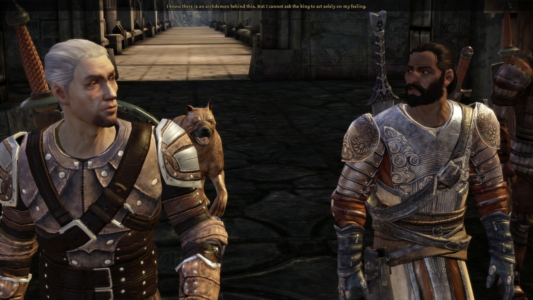
I chose a decidedly middle-aged and haggard appearance, but the character is supposed to be fairly young, I think.
The Origins of the title is a reference to your own character’s origin story, which varies depending on your selected character class and background, and is sellotaped onto the game as an opening prologue, before circumstances see you taken under the wing of a mysterious stranger representing the Grey Wardens, revered guardians of the kingdom of Ferelden, who warns of a coming Blight, during which nefarious creatures known as the Darkspawn will emerge from deep underground and overwhelm those on the surface.
And so, in the time-honoured tradition, something bad is happening, and only you are in a position to stop it, by venturing far and wide to unite the disparate forces of the kingdom against this deadly common foe that threatens them all. Joining you on this quest will be an ever-growing array of companions, at first limited to your fellow Grey Warden, Alistair, and your faithful War Hound, Woofles (or a more sensible name of your choosing), but later featuring a range of warriors, mages and rogues to cater for any occasion.
It’s a bit of a slow starter. While your own expertise and experience may differ, your correspondent spent the first 10-12 hours or so moving from place to place, clicking through various dialogues, bungling through combat and trying his best to put some thought into levelling up each character in a way that might not ruin the game, or make it significantly more difficult, later, all the while not quite understanding exactly what was going on or what might be required in the real meat of the game proper.
On the surface, combat isn’t all that different from other Bioware titles of a similar vintage, requiring a combination of pausing and planning and real-time urgency requiring direct control. It’s telling, though, that while the majority of the action takes place in third person, with nice zoomed-in cut-scenes, for combat, you really need to zoom right out into a pseudo-isometric view to get sufficient oversight of the action.
Indeed, it may take being on the receiving end of quite a few batterings, and super-quick obliterations of your entire party, to fully understand that a balanced squad, working as a team with some level of co-ordination, is required to succeed, and that, for example, just taking control of your beefy warrior Grey Warden and slicing through enemies while occasionally stopping to tell one of your companions to do a big spell just won’t cut it.
This learning process will doubtless also encompass a sense of irritation at the fiddliness of some of the narrow corridor battles, as well as the difficulties experienced in trying to keep control of your party when dealing with more open areas. When things go wrong, it feels a little bit like being overrun in Command and Conquer, where inattentive and repeated clicking will get you nowhere fast.
Even a more considered approach may not be sufficient on its own, and developing at least a rudimentary understanding of the Combat Tactics feature, whereby you can automate certain behaviours depending on circumstances, is also necessary. While seasoned experts will have few problems, the Normal difficulty level should be plenty challenging enough for most.
In terms of structure, the bulk of your battling will take place in one of the major hubs to which you have to travel, with a variety of minor and story-based quests available to complete. There are also some random encounters along the way, with your progress on the world map occasionally interrupted to battle some bandits, or some wolves, or some bandits and wolves, in order to give the impression that you are in fact traversing a huge kingdom rather than observing a glorified loading screen.
It has to be said that this doesn’t quite work as well as getting on a ship and speeding between different galaxies in Knights of the Old Republic or Mass Effect, especially as these interludes also provide a natural opportunity to catch up with companions. Here, the equivalent is the camp, to which you have to remember to go before setting off, rather than it being a natural stopping off point before each journey. The random encounters do also rather feel like padding and, particularly early on, can be rather difficult.
Forgetting to visit the camp often not only means you miss out on a cost-free healing of injuries, but that you may also neglect your companions, particularly if they don’t feature regularly in your party, and are hence denied opportunities to win their trust and affection by unlocking and completing optional quests during which you defend their honour in some way. While there are more than enough personalities for everyone to have a few favourites, I personally found it too easy to ignore others almost entirely, before panicking and hurriedly Googling ‘Do you need to level up all your companions in Dragon Age: Origins?’ somewhere towards the end.
In general, the story feels to be spread rather thinly across what is a rather bulky game (spanning 70 hours or so) and matters are not helped by dull performances from some of the major players and occasionally underwhelming character graphics across the board. However, firmly in the game’s favour is the fact that in place of the generic good/bad choices available elsewhere, there are some genuine dilemmas presented to your character here, and quite a few occasions upon which you are going to piss someone off with your choice, rather than keeping most people happy most of the time with blandly nice decisions (although the inclusion of gifts – items that can be found or bought and given to your party to improve their opinion of you as needed – is a slight cop-out in this regard).
Unusually, it was one of the DLC characters, the golem Shale, who was my favourite, thanks to a combination of being an uncomplicated hard bastard in combat (being made of rock will do that) and a rather camp presence in cut-scenes, throwing shade at you at almost every opportunity during dialogue. (The inclusion of golems here, like the presence of spirits and shapeshifters, does evoke memories of Jade Empire, although perhaps my relative proximity to that game made it stand out a little more than it might to others.)
During a hefty feast such as this, it’s hard to remember – even with notes – exactly when things start to come together, and whether it all gets easier because you understand the game better, or because your characters are becoming more powerful. Most likely, it’s a combination of both, putting the rapid deaths (mostly) behind you, and cultivating an understanding of what abilities your warriors, rogues and mages all need to develop, and how they best work together on the battlefield. Rather than just nodding along while the game tells you that certain characters, items, or powers work best up close, and others at distance, you start to plan out a basic approach to most encounters, hitting groups of enemies with powerful attacks from distance with your mages, for example, while your warrior goes in to deliver a close-encounters pummelling.
What I became keenly aware of while playing Dragon Age: Origins was a sense that my usual approach to similar RPGs – of understanding and doing enough just to succeed and progress the story – was replaced by a certain level of investment in the more nerdy aspects of character creation and development. This went beyond mild regret at some skill and talent choices, through some more detailed calculations about what to do with each active party member further down the line, and even down to a reconsideration of my default life choice of beefy fighting man for the player character. I was left with the feeling that there were aspects of the game that I simply hadn’t had a chance to explore this time, and if I were ever to play it again, I would certainly take the opportunity to do so.
Whether that would quite be enough to override the feeling of fatigue that accompanies the completion of a lengthy game featuring occasionally repetitive and uninspired questing, I’m not sure. Certainly, by the time of my final journey to the dwarven kingdom of Orzammar, and the requirement once there to venture into a series of empty and similar-looking dungeons known as the ‘Deep Roads’, my attention did start to wander. Whether I’d have felt similarly had things been attempted in a different order, it’s hard to say, although I did come to regard the name ‘Deep Roads’ as semi-parodic, no matter how much I was told by different characters that these vast rocky ruins once housed thriving dwarven communities.
And while there are moments of visual beauty, they’re usually glimpsed in brief, as you take a moment to admire the view from a cliffside castle. Unlike in, say, The Elder Scrolls: Oblivion – or even Assassin’s Creed – those moments where you look at a city in the middle distance and can then travel there without any break in play are largely absent here. For all the hours you spend in Ferelden, the questing seems fairly relentlessly task-focused, venturing from hub to hub to do the next thing, and the lack of opportunity for more laid-back exploration and fun may be considered a drawback for some.
The broader tale being told also doesn’t quite inspire a repeat either, and while there are some genuinely tricky decisions to be made – and I wasn’t always sure I was happy with my choices – the grand climax doesn’t quite make the impact that you might hope for in terms of consequences, or indeed in exchange for the amount of time invested in the hacking and magicking that leads up to that point.
Indeed, during the final cut-scenes, I even found that a fairly key sidekick who had been a major player in the closing story beats was absent completely, and was unsure whether this was due to a bug or simply a slightly weak way of letting me know he had died off screen. Had I been more invested in his fate – which I think I was supposed to be – I would have been really annoyed, but instead shrugged it off without much fuss or further investigation.
Equally, the payoff to the origin story also felt a little slight, although this is likely a by-product of the many hours of play between the prologue and the ending, during which these events are rarely mentioned, leaving me slightly at a loss as to who was who and quite why it all mattered so much. While I would certainly choose a different one if I were to play again, I’m not sure it would necessarily make for a massively different experience on its own.
Still, all of this is picking at the edges of what is generally a fairly meaty and satisfying role-playing adventure. It would be a very long game to play without the experience being pretty enjoyable, and I certainly wouldn’t have toughed it out in those circumstances. (Nor, indeed, would I be considering covering the expansion – Awakening – in the near future). While I went in expecting it to be broadly like other things I liked, except with different outfits, I instead experienced something that, in forcing me to delve a little deeper into the hoary mechanics of role playing and party composition, rewarded me in a different way.

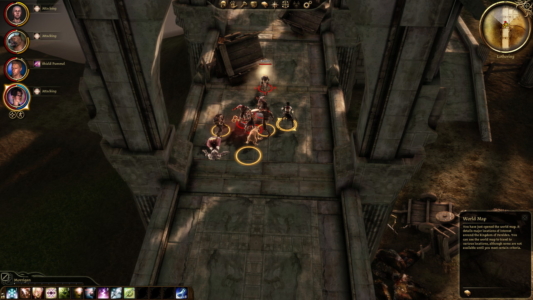
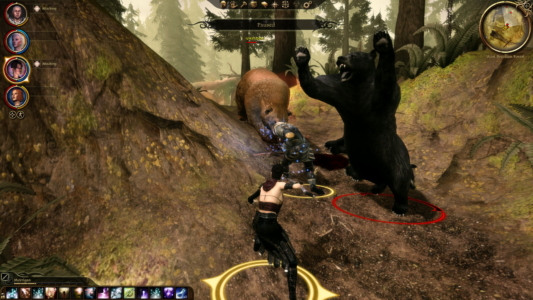
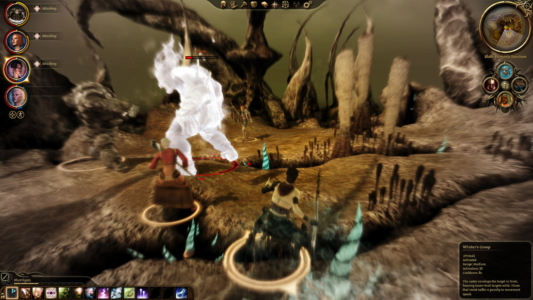
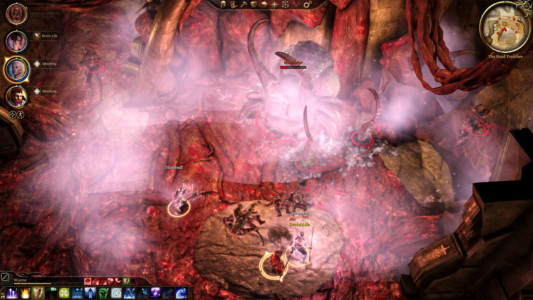
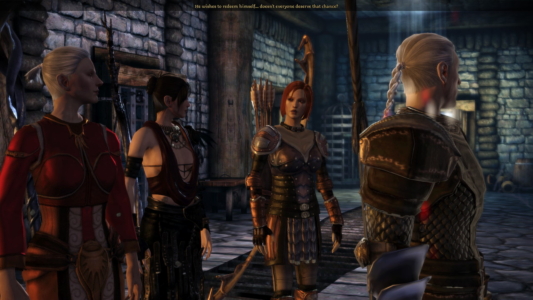

 Posts
Posts
You’ve done all the 2000s BioWares now, I believe. Mass Effect, Jade Empire, Old Republic, this one. So do you have an overall favorite among them? Or is it mostly “just pick your favorite setting?”
April 9, 2024 @ 9:48 pm
I enjoyed Jade Empire but the combat did feel like a slog at times. I was surprised how well KOTOR had aged and that it stood up to Mass Effect despite the generation gap. And this one certainly made me think a bit more about what I was doing.
It’s hard to separate Mass Effect from the sequels even though the first one is a bit clunky by comparison. Also it was my introduction to Bioware, and I first played it quite a bit closer to release than we are now, so maybe I’m a little swayed by that too. But the idea of your character and choices being carried through across three games sort of still gives it the edge.
Possibly I also preferred playing as a version of Shepard, and all of his (in my playthrough) dialogue being voiced, rather than just clicking on text and having people respond to what ‘Rik Hard’ supposedly said.
But, you know, in a classic cop-out move, I did give most of them the same score, so there’s not a lot to choose between them. Although while they definitely have common features and some of the same through lines, each was a distinctive enough experience to stand apart from the others. Expecting ‘Mass Effect with beards’ for this one, for example, was a clear mistake.
April 10, 2024 @ 11:33 am